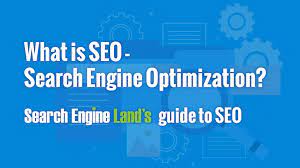Search Engine Optimization: The Key to Successful Internet Marketing
In today’s digital world, internet marketing has become an essential tool for businesses to reach their target audience and drive traffic to their websites. Among the various strategies available, Search Engine Optimization (SEO) stands out as a crucial component of any successful internet marketing campaign. In this article, we will explore the importance of SEO and how it can significantly impact your online presence.
What is Search Engine Optimization?
Search Engine Optimization refers to the process of optimizing your website and its content to improve its visibility on search engine results pages (SERPs). The goal is to increase organic or non-paid traffic from search engines like Google, Bing, or Yahoo. By implementing various techniques and strategies, SEO aims to improve your website’s ranking in search engine results, making it more likely for users to find and visit your site.
Why is SEO Important for Internet Marketing?
Increased Organic Traffic: The majority of web traffic comes from search engines. When your website ranks higher in search results, it attracts more organic traffic. This means that users are finding your website naturally through their searches rather than through paid advertisements.
Cost-Effective Strategy: Unlike paid advertising methods such as pay-per-click (PPC), SEO provides a cost-effective long-term solution for driving organic traffic to your website. Although it requires time and effort upfront, the results can be long-lasting without ongoing expenses.
Enhanced User Experience: SEO involves optimizing various aspects of your website, including its structure, navigation, content quality, and loading speed. These improvements not only make it easier for search engines to crawl and index your site but also enhance the user experience. A well-optimized website is more likely to engage visitors and encourage them to stay longer.
Targeted Audience Reach: SEO allows you to target specific keywords or phrases relevant to your business niche or industry. By optimizing your content around these keywords, you can attract users who are actively searching for products or services related to your business. This targeted approach ensures that you reach the right audience, increasing the chances of conversions and sales.
Builds Trust and Credibility: When your website appears on the first page of search results, users perceive it as more trustworthy and credible. High search engine rankings imply that your website is relevant, authoritative, and provides valuable information or products/services. This trust factor can significantly impact user behavior and increase their likelihood of engaging with your brand.
Effective SEO Strategies for Internet Marketing:
Keyword Research: Identify relevant keywords and phrases that your target audience is using to search for products or services in your industry. Incorporate these keywords naturally into your website content to improve its visibility in search results.
On-Page Optimization: Optimize various on-page elements such as meta tags, headings, URLs, and image alt tags to make it easier for search engines to understand the context of your content.
Quality Content Creation: Develop informative, engaging, and unique content that provides value to users. High-quality content is more likely to be shared, linked to, and referenced by other websites – all factors that contribute to improved search rankings.
Link Building: Acquire high-quality backlinks from reputable websites in your industry. These links act as endorsements for your website’s authority and credibility in the eyes of search engines.
Mobile-Friendly Design: With the increasing use of mobile devices for internet browsing, having a responsive website design is crucial for SEO success. Ensure that your site is optimized for mobile devices to provide a seamless user experience across all platforms.
In conclusion, Search Engine Optimization plays a vital role in successful internet marketing strategies. By implementing effective SEO techniques, businesses can increase their online visibility, attract targeted traffic, build trust with their audience, and ultimately drive conversions and sales. Investing time and effort into optimizing your website for search engines is a worthwhile endeavor that can yield significant long-term benefits for your business.
10 Commonly Asked Questions About Search Engine Optimization in Internet Marketing: Explained
- How to use Search Engine Optimization in marketing?
- What is search engine optimization in marketing?
- Why Search Engine Optimization is important in digital marketing?
- What is search engine optimization in Internet?
- What is Search Engine Optimization in Internet marketing?
- Is Search Engine Optimization a marketing strategy?
- What is search engine optimization in social media marketing?
- Is Search Engine Optimization a marketing tool?
- What are the 3 types of SEO optimizations?
- Why is SEO important for marketing?
How to use Search Engine Optimization in marketing?
Using Search Engine Optimization (SEO) in marketing is crucial for improving your website’s visibility and driving organic traffic. Here are some key steps to effectively incorporate SEO into your marketing strategy:
- Keyword Research: Start by conducting thorough keyword research to identify the relevant keywords and phrases that your target audience is using in their search queries. Use tools like Google Keyword Planner, SEMrush, or Moz Keyword Explorer to find high-volume and low-competition keywords that align with your business offerings.
- On-Page Optimization: Optimize your website’s on-page elements to make it more search engine-friendly. This includes optimizing meta tags (title tags and meta descriptions), headings, URLs, and image alt tags. Incorporate the identified keywords naturally into these elements while keeping them concise and compelling.
- Quality Content Creation: Develop high-quality, informative, and engaging content that provides value to your target audience. Create blog posts, articles, videos, infographics, or any other content formats that resonate with your audience’s interests and needs. Incorporate the identified keywords strategically throughout the content while ensuring it remains natural and readable.
- Link Building: Build a strong network of high-quality backlinks from reputable websites in your industry. Seek opportunities for guest posting, collaborations, or partnerships with influencers or industry experts who can link back to your website. These backlinks act as endorsements of your website’s authority and credibility in the eyes of search engines.
- Technical SEO: Ensure that your website has a solid technical foundation for optimal search engine crawling and indexing. This includes optimizing site speed by compressing images, improving mobile responsiveness for a seamless user experience across devices, implementing proper URL structures, creating XML sitemaps, and utilizing structured data markup.
- User Experience Optimization: Enhance the overall user experience on your website by making it easy to navigate, visually appealing, and intuitive for users to find what they’re looking for. Improve page load times, organize content logically, and ensure that your website is accessible on different devices and browsers.
- Regular Monitoring and Analysis: Continuously monitor your website’s performance using tools like Google Analytics and Google Search Console. Analyze key metrics such as organic traffic, keyword rankings, bounce rates, and conversion rates. Use this data to identify areas for improvement and refine your SEO strategies accordingly.
- Stay Updated with Algorithm Changes: Search engine algorithms are constantly evolving, so it’s essential to stay updated with the latest trends and algorithm changes. Follow reputable SEO blogs, attend webinars or conferences, and keep an eye on industry news to adapt your SEO strategies accordingly.
By incorporating these steps into your marketing efforts, you can effectively utilize SEO to improve your website’s visibility in search engine results pages (SERPs), attract targeted organic traffic, build brand credibility, and ultimately drive conversions and business growth.
What is search engine optimization in marketing?
Search Engine Optimization (SEO) in marketing refers to the practice of optimizing a website and its content to improve its visibility and ranking on search engine results pages (SERPs). It is a strategic approach that aims to increase organic or non-paid traffic from search engines by making the website more relevant and authoritative in the eyes of search algorithms.
In the context of marketing, SEO plays a crucial role in driving targeted traffic to a website, increasing brand visibility, and ultimately driving conversions and sales. By optimizing various elements such as on-page content, meta tags, headings, URLs, and backlinks, businesses can improve their website’s chances of appearing higher in search results for relevant keywords or phrases.
The goal of SEO in marketing is to ensure that when users search for products or services related to a business’s industry or niche, their website appears prominently in the search results. This increased visibility not only attracts more organic traffic but also establishes trust and credibility with potential customers. Users often perceive websites that rank higher on search engines as more trustworthy and authoritative.
SEO techniques involve extensive keyword research to identify relevant terms that users are searching for. These keywords are then strategically incorporated into the website’s content, headings, and meta tags. Additionally, SEO involves optimizing the website’s structure, navigation, site speed, mobile-friendliness, and user experience to enhance its overall quality.
By implementing effective SEO strategies, businesses can position themselves as industry leaders while reaching their target audience at critical points during their purchasing journey. SEO is an essential component of any comprehensive marketing strategy as it helps businesses maximize their online presence and compete effectively in today’s digital landscape.
Why Search Engine Optimization is important in digital marketing?
Search Engine Optimization (SEO) is crucial in digital marketing for several reasons:
- Increased Visibility: SEO helps improve your website’s visibility on search engine results pages (SERPs). When your website ranks higher in search results, it becomes more visible to potential customers who are actively searching for products or services related to your business. Increased visibility leads to more organic traffic and brand exposure.
- Targeted Traffic: SEO allows you to target specific keywords or phrases relevant to your business. By optimizing your website and content around these keywords, you attract users who have a genuine interest in what you offer. This targeted approach ensures that you reach the right audience, increasing the chances of conversions and sales.
- Cost-Effective Strategy: Unlike paid advertising methods like pay-per-click (PPC), SEO provides a cost-effective long-term solution for driving organic traffic to your website. While it requires time and effort upfront, the results can be long-lasting without ongoing expenses. This makes SEO an attractive option for businesses with limited marketing budgets.
- Builds Trust and Credibility: When your website appears on the first page of search results, users perceive it as more trustworthy and credible. High search engine rankings imply that your website is relevant, authoritative, and provides valuable information or products/services. This trust factor can significantly impact user behavior and increase their likelihood of engaging with your brand.
- Enhanced User Experience: SEO involves optimizing various aspects of your website, such as its structure, navigation, content quality, and loading speed. These improvements not only make it easier for search engines to crawl and index your site but also enhance the user experience. A well-optimized website is more likely to engage visitors and encourage them to stay longer, reducing bounce rates and improving overall user satisfaction.
- Competitive Advantage: In today’s competitive digital landscape, businesses need every advantage they can get to stand out from the crowd. Implementing effective SEO strategies gives you a competitive edge by helping your website rank higher than your competitors in search results. This increased visibility can lead to more traffic, conversions, and ultimately, business success.
In summary, SEO is vital in digital marketing because it improves your website’s visibility, drives targeted traffic, builds trust and credibility, enhances user experience, provides a cost-effective marketing strategy, and gives you a competitive advantage. By investing in SEO, businesses can significantly increase their online presence and achieve their marketing goals.
What is search engine optimization in Internet?
Search Engine Optimization (SEO) in the context of the internet refers to the practice of optimizing a website and its content to improve its visibility and ranking on search engine results pages (SERPs). The goal of SEO is to increase organic or non-paid traffic from search engines by making the website more relevant and appealing to both search engines and users.
When a user searches for information, products, or services on a search engine like Google, Bing, or Yahoo, they are presented with a list of results that are deemed most relevant to their query. SEO involves various techniques and strategies that aim to improve a website’s ranking in these search results.
The process of SEO includes optimizing various aspects of a website, such as its structure, content quality, keywords usage, meta tags, URLs, and internal linking. It also involves off-page optimization activities like acquiring high-quality backlinks from other websites.
By implementing effective SEO practices, businesses can increase their online visibility and attract targeted organic traffic. This means that users are finding their website naturally through their searches rather than through paid advertisements. Higher rankings in search results can lead to increased brand exposure, website visits, conversions, and ultimately business growth.
It’s important to note that SEO is an ongoing process as search engines frequently update their algorithms to provide users with the best possible results. Therefore, businesses need to stay up-to-date with industry trends and adapt their SEO strategies accordingly to maintain or improve their online presence.
What is Search Engine Optimization in Internet marketing?
Search Engine Optimization (SEO) in internet marketing refers to the practice of optimizing a website and its content to improve its visibility and ranking on search engine results pages (SERPs). It involves various techniques and strategies aimed at increasing organic or non-paid traffic from search engines.
The goal of SEO is to make your website more accessible to search engines, ensuring that it appears prominently in relevant search queries. By optimizing your website’s structure, content, and other elements, you can improve its chances of ranking higher in search results.
SEO is an integral part of internet marketing because it helps businesses attract targeted traffic and reach their desired audience. When your website ranks higher in search results, it increases the likelihood of users clicking on your link and visiting your site. This organic traffic is valuable as it consists of users actively searching for products, services, or information related to your business.
Furthermore, SEO is cost-effective compared to paid advertising methods like pay-per-click (PPC). While PPC campaigns require ongoing expenses, SEO provides a long-term solution for driving organic traffic without additional costs once implemented effectively.
In addition to driving traffic, SEO also focuses on enhancing the user experience. By optimizing factors such as website speed, mobile responsiveness, and user-friendly navigation, you can provide a seamless browsing experience that keeps visitors engaged and encourages them to explore further.
Effective SEO strategies include keyword research to identify relevant terms used by your target audience, on-page optimization by optimizing meta tags and headings with keywords, creating high-quality content that provides value to users and attracts links from other websites (link building), and ensuring mobile-friendly design for optimal user experience across devices.
Overall, Search Engine Optimization is a crucial aspect of internet marketing as it helps businesses increase their online visibility, attract targeted traffic from search engines, build trust with their audience through higher rankings in SERPs, and ultimately drive conversions and sales.
Is Search Engine Optimization a marketing strategy?
Yes, Search Engine Optimization (SEO) is considered a marketing strategy. It is a set of techniques and practices used to optimize a website’s visibility and ranking on search engine results pages (SERPs). By implementing SEO strategies, businesses aim to increase organic or non-paid traffic to their website, attract their target audience, and improve their online presence. SEO is an integral part of digital marketing and plays a crucial role in driving traffic, enhancing user experience, and ultimately generating leads and conversions.
What is search engine optimization in social media marketing?
Search Engine Optimization (SEO) in Social Media Marketing
Search Engine Optimization (SEO) is commonly associated with improving a website’s visibility and ranking on search engine results pages. However, SEO techniques can also be applied to social media marketing to enhance a brand’s online presence and increase its reach. In this article, we will explore how SEO can be utilized in social media marketing strategies.
Optimizing Social Media Profiles:
Just like optimizing a website, it’s essential to optimize your social media profiles for search engines. This includes using relevant keywords in your profile name, bio, and description. By incorporating keywords that are relevant to your industry or niche, you increase the chances of your social media profiles appearing in search engine results when users search for related topics.
Keyword Research:
Conducting keyword research is crucial for both website SEO and social media marketing. By identifying popular keywords and phrases related to your industry or target audience, you can optimize your social media content accordingly. Incorporating these keywords into your posts, captions, hashtags, and even profile names helps improve the discoverability of your content on social media platforms.
Content Optimization:
Optimizing the content you share on social media platforms is essential for increasing visibility and engagement. Use relevant keywords naturally within your posts to make them more searchable by both users and search engines. Additionally, ensure that your content is valuable, engaging, and shareable to encourage user interaction and increase the likelihood of it being shared across various platforms.
Link Building:
Building high-quality backlinks is a fundamental aspect of traditional SEO practices. Similarly, incorporating link building strategies into your social media marketing efforts can improve brand visibility and drive traffic back to your website or other online assets. Share links to relevant blog posts or landing pages within your social media posts to direct users back to valuable content on your website.
Hashtag Usage:
Hashtags play a significant role in organizing and categorizing content on social media platforms. By using relevant and popular hashtags in your posts, you increase the chances of your content being discovered by users interested in those topics. Research industry-specific hashtags and incorporate them into your social media posts to expand your reach and engagement.
Social Sharing Buttons:
Including social sharing buttons on your website or blog allows visitors to easily share your content across their own social media profiles. This not only increases the visibility of your content but also encourages others to engage with it, leading to potential brand exposure and increased traffic.
Monitoring and Analytics:
Regularly monitor the performance of your social media marketing efforts using analytics tools. Analyze metrics such as engagement rates, reach, click-through rates, and conversions to understand which strategies are working effectively and which areas need improvement. By monitoring these metrics, you can make data-driven decisions to optimize your social media marketing campaigns further.
Incorporating SEO techniques into your social media marketing strategy can significantly enhance brand visibility, increase engagement, and drive organic traffic to your online assets. By optimizing profiles, conducting keyword research, creating valuable content, building links, utilizing hashtags effectively, enabling social sharing buttons, and monitoring analytics, businesses can maximize their impact on social media platforms while aligning with SEO best practices.
Is Search Engine Optimization a marketing tool?
Yes, Search Engine Optimization (SEO) is considered a marketing tool. It is a crucial component of digital marketing strategies aimed at improving a website’s visibility and driving organic traffic from search engines. SEO involves optimizing various elements of a website, such as content, structure, and keywords, to improve its rankings in search engine results pages (SERPs). By increasing a website’s visibility and attracting more organic traffic, SEO helps businesses reach their target audience and promote their products or services effectively. It is an essential tool for increasing online visibility, brand awareness, and ultimately driving conversions and sales.
What are the 3 types of SEO optimizations?
The three types of SEO optimizations are:
- On-Page SEO: On-page optimization focuses on optimizing individual web pages to improve their search engine rankings and attract organic traffic. It involves optimizing various elements within the webpage, including meta tags, headings, URLs, keyword placement, content quality, internal linking structure, and image optimization. On-page SEO ensures that search engines can understand the content and relevance of a webpage, making it more likely to rank higher in search results.
- Off-Page SEO: Off-page optimization refers to activities conducted outside of your website to improve its visibility and authority in search engine rankings. It primarily involves building high-quality backlinks from other reputable websites. Backlinks act as endorsements for your website’s credibility and authority in the eyes of search engines. Off-page SEO also includes activities such as social media marketing, influencer outreach, guest blogging, and online reputation management.
- Technical SEO: Technical SEO focuses on optimizing the technical aspects of your website to improve its crawlability, indexability, and overall performance. It involves ensuring that search engine bots can easily crawl and index your website’s pages by implementing proper sitemaps, robots.txt files, canonical tags, structured data markup, and XML sitemaps. Technical SEO also includes optimizing website speed, mobile-friendliness, URL structure, site architecture, and resolving any technical issues that may hinder search engine visibility.
By implementing all three types of optimizations effectively – on-page SEO to optimize individual webpages for relevant keywords; off-page SEO to build quality backlinks and increase online reputation; and technical SEO to ensure proper indexing and crawling – businesses can enhance their chances of ranking higher in search engine results pages (SERPs) and attract targeted organic traffic to their websites.
Why is SEO important for marketing?
SEO (Search Engine Optimization) is crucial for marketing for several reasons:
- Increased Visibility: SEO helps improve your website’s visibility on search engine results pages (SERPs). When your website ranks higher, it becomes more visible to users searching for relevant keywords or phrases. Increased visibility leads to more organic traffic and exposure for your brand.
- Organic Traffic: Organic traffic refers to visitors who find your website through non-paid search engine results. SEO focuses on optimizing your website’s content, structure, and other elements to attract organic traffic. This type of traffic is valuable as it indicates genuine interest from users actively seeking information or solutions related to your business.
- Cost-Effective Strategy: Compared to paid advertising methods like pay-per-click (PPC), SEO offers a cost-effective long-term solution. While SEO requires time and effort initially, the results can be long-lasting without ongoing expenses. It provides a sustainable way to drive targeted traffic to your website without relying solely on paid advertising.
- Trust and Credibility: High search engine rankings contribute to building trust and credibility with users. When your website appears on the first page of search results, it signals that search engines recognize it as relevant and authoritative in its industry or niche. This perception of trustworthiness can positively impact user behavior and increase their likelihood of engaging with your brand.
- Targeted Audience Reach: SEO allows you to target specific keywords or phrases relevant to your business or industry. By optimizing your website around these keywords, you can attract users who are actively searching for products or services like yours. This targeted approach ensures you reach the right audience, increasing the chances of conversions and sales.
- Enhanced User Experience: SEO involves optimizing various aspects of your website, such as its structure, navigation, content quality, and loading speed. These improvements not only make it easier for search engines to crawl and index your site but also enhance the user experience. A well-optimized website is more likely to engage visitors, reduce bounce rates, and encourage them to stay longer.
- Competitive Advantage: In today’s digital landscape, competition is fierce. Businesses that invest in SEO gain a competitive advantage by improving their online presence and visibility. By outranking competitors in search results, you can attract more traffic and potential customers to your website.
In summary, SEO is essential for marketing because it increases visibility, drives organic traffic, provides a cost-effective strategy, builds trust with users, reaches targeted audiences, enhances the user experience, and offers a competitive advantage. By implementing effective SEO strategies, businesses can achieve long-term success in the digital realm.




